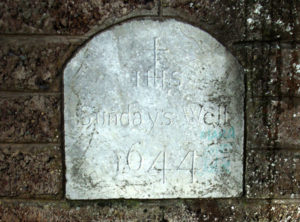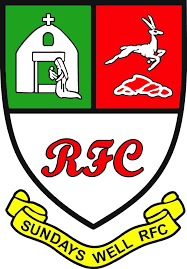
The parish of Sunday’s Well in Cork can be traced back to 1644.
History recalls that a holy well in the area, with miraculous powers was usually visited by the sick on a Sunday.
CLUB HISTORY
History 1906-1923
Sunday’s Well Rugby Club was founded in 1906, by a group of choir and altar boys from St Vincent’s Church, in the parish on the Northside of Cork City, from which the club derives its name. Despite having lasted for over a hundred years, those early formative years proved to be a turbulent time for the club, reflecting the general situation both in Ireland and across Europe, during the early stages of the 20th century. The Club started out as a Minor team and was twice disbanded, firstly at the end of its second season and again at the outbreak of the Great War.
Despite only lasting a short two years on its initial stint, the Club did get to taste success as it claimed its first trophy in 1907, with a victory in the Tramway Cup Final over Constitution, a club with whom the ‘Well were to have many more notable battles in the years to come. The ‘Well produced a strong display to win 8-0 with tries from Captain H.E. Dawson and J.J. Murphy helping to secure victory.
The club didn’t take long to reform, with William O’Driscoll playing a pivotal role in getting the Club back together for the 1910-11 season. The Club once again enjoyed success in the Tramway Cup in a thrilling decider against Dolphin. Two tries from West, one from Bradley and a drop goal from Ryall saw the ‘Well lift the Cup for the second time, at Victoria Cross. The outbreak of the Great War and its aftermath, including the War of Independence and Civil War, meant the club again was once again broken up, only to reform again in 1923.

Building Foundations: 1923-1948
On October 18th 1923, a meeting presided over by Mr J McCarthy, saw the Club being once again reformed, with William O’Driscoll once again playing a pivotal role along with Matt Dwane and John K. Kelleher. The club was confident of having strong foundations and was set to enter two teams into competition, although the timing of the reformation meant that it was too late to participate in that season’s League competitions. The Club still did not have any established home premises and for twenty years played home games at rented venues such as Houndsditch, Clogheen and Victoria Cross.
The Club once again proved its enthusiasm for Cup competitions as they claimed the Minor Cup in their first season, with an impressive 11-0 victory over Cork Bankers and followed that up the next year by claiming the Tramway Cup for the third time, once again defeating Cork Constitution, while the Juniors were very unlucky not to claim the League title with an unfortunate loss in their final game to Dolphin, denying them the honours. The Tramway Cup was to produce more glory for the side in upcoming years, although they had to wait over a year for their medals from the 1924/25 season, after a series of objections
For the next couple of seasons the Club continued to produce a series of impressive performances in both League and Cup and in 1926 the Club gained the notable achievement of being given Senior status, having made an application to the Munster Branch.
This was obviously a significant step up for the players and in those early senior competitions, they made steady progress year on year. The Club was developing great strength in depth and the second string team, which had to also step up a grade to Junior level, proved well capable of holding their own and reached a number of semi-finals in the Junior Cup.
Back in these days, Cup games were all the focus, with the Munster Senior Cup being the undisputed primary competition. The ‘Well produced many respectable displays in its early years and finally managed to earn a victory in 1932, when they overcame a fancied UCC side 5-3 courtesy of a try from the great Michael Powell and a conversion from Tom Barry. Powell had earlier earned Interprovincial Caps for Munster and was unfortunate not to be capped by Ireland, having been called up as a travelling reserve for the clash with South Africa in 1931. A very strong Cork Con’ side provided the next opposition and the Temple Hill team required a replay before prevailing with a late penalty by J.T. Egan, proving to be the only score in both ties.
In 1934, the Club reached its first Munster Senior Cup Final under the guidance of Gussy McSweeney, after wins over local rivals UCC and Cork Constitution (their first ever victory over Con at Senior level). In the final they faced a strong Garryowen side in the Market’s Field in Limerick but the ‘Well weren’t short of support with a special train being arranged for travelling supporters. The ‘Well players didn’t let anyone down, with Michael Powel, Gussy McSweeney and Tom Barry all enjoying outstanding games but Garryowen narrowly prevailed 6-0.
The Club continued to enjoy impressive performances on the pitch for the next season, but the outbreak of the Emergency/World War II had an impact on the fixtures. This period was still a pivotal time in the club’s history. Firstly, the club established a permanent base on the opposite bank of the river, as they moved to the current residence at Musgrave Park, where they began their ground-share with Dolphin. Kate Kearney’s cottage, which is currently located behind the East stand was used by both clubs as their original dressing rooms which the ‘Well continued to use until the current clubhouse was established in 1960, with an extension added in 1981.
This period was also important as the lead up to one of the most successful eras in the club’s history, with many of the greatest ‘Well players gradually reaching their peak. Of these players, one of the most notable was Ernie Keeffe who had the great distinction of being the club’s first ever International when he was capped in the 1947 Five Nations Championship. A solid second row, he was a dominant force in the line-out and a great operator in open play, Ernie, who was at the peak of his career,no doubt, would have won more than his six caps, only for the intervention of the World War.
Two further internationals were to play alongside Ernie in his latter years; James Corcoran and Mick Madden. Like Keeffe these were two robust powerful front men who weren’t afraid of the forward battles and were always prepared to put their bodies on the line. They helped provide the ‘Well with a powerful pack that was the envy of many clubs
Keeffe was surrounded by a very talented side. The Dalys, Dan and Jerry, were coming to the fore and would establish a long established family tradition with the ‘Well. Another great family dynasty is the Barry’s whose relationship goes right back to the early years of the club, with Michael Barry proving a great leader when given the captaincy. The McNamee brothers; Tim and Tom were also starting to make an impact on the team and the platform for future greatness was set.
There were also many great servants in the committee rooms that were instrumental in building up the club’s success. Former stars Matt Cooper (Sr.) and Michael Powell, along with Jim Turnbull and several others helped in the background as the club began to enter into a golden period.
Cup Glory at last
1948 saw Ireland win the Grand Slam and with that great success, the popularity of rugby through the country was peaking. Cup matches were played to large crowds and the ‘Well thrived in such intense encounters as they won their first ever Senior cup in the 1948/49 season. The ‘Well began their campaign with a tie against Young Munster. Revenge was very much on the ‘Well’s mind having lost a fiery game against the same opposition in the previous season’s semi-final.
The two sides had built up a strong rivalry and it was a very intense affair with both sides fired up for the game. Dan Daly enjoyed a magnificent game with the boot while Jonny Vaughan scored a crucial try as the ‘Well booked a semi-final with cup specialists Garryowen on a warm balmy day in the Mardyke. It was a very tight game with both defences on top and the game finished scoreless. The replay was held in Limerick with a big local crowd supporting the Light Blues but they were matched by a large travelling Cork contingent.
The game again proved very tight and the ‘Well’s hopes weren’t helped by the loss of Frank Jackson and Michael Corcoran but the remaining thirteen players upped their efforts even more and managed to force a penalty that Dan Daly coolly slotted over to put the ‘Well into the decider where they were to face fellow Musgrave Park tenants Dolphin.
Dolphin would have started the game as favourites in front of a packed out Mardyke crowd but the ‘Well set their stall out from early on with a new look front-row dominating the scrum while Keeffe and Barry McGarry were supreme in the line-out. Timmy McNamee raced through for a try which Daly converted and Mick Barry ensured the Cup would go to the ‘Well with the ‘Well’s second try. Great scenes of jubilation erupted at the final whistle as Barry fittingly lifted the Cup to great cheers and roars.
This success whetted the club’s appetite for Cup glory. In the following number of years, the club won many trophies during the 50s. The club was enjoying great success at all grades with strong Junior and Minor sides ensuring that the Seniors had plenty of able replacements to call on. 1952 saw the Juniors reach the Cup Final where they cam agonisingly close to toppling Richmond with Joe Kelleher and Jimmy Jackson scoring tries in a replay that again ended in a draw but at the third time of asking the Limerick side narrowly edged another epic encounter.
In 1953, the ‘Well once again reached the Senior Cup Final where Garryowen provided the opposition. Dan Daly was a key player for the ‘Well while his brother was captain of the side. The Limerick side got off to a good start courtesy of a Kevin Quilligan penalty but a hungry Sunday’s Well side were not going to be beaten and they dominated the remaining proceedings with a Tommy Jackson penalty and a try by Joe Kelleher securing victory. The Final was repeated the following year with Garryowen prevailing and while the ‘Well continued to be a major force in senior rugby throughout the decade it would be another forty years before the club would once again lift the famous trophy.
It was hard for the club to replicate such success but they continued to be a formidable force and produced many quality internationals throughout the next twenty years. Jim Buckley, Oliver Waldron and Michael O’Callaghan were all formidable players who donned the famous green jersey and they served both club and country proud when playing.
The stand out player during this period was probably Jerry Walsh. Walsh bucked the trend for ‘Well internationals, as he actually plied his trade in the back-line as a centre and is arguably one of the country’s greatest players in that position. He is also the only ‘Well player to have represented the British and Irish Lions when he toured Australia in 1966 and won many plaudits for his quality performances but unfortunately was unable to participate in the Tests as he returned home mid-tour following the death of his father.
The ‘Well reached three Cup Finals in the 60s but came up empty handed on each occasion. In 1963, two aforementioned ‘Well stars; Waldron and Walsh actually played against the ‘Well in the Final as they helped UCC to a narrow 3-0 win. In 1965, a star studded Cork Con’ team won a final while the rivalry with Garryowen was renewed in 1969 where the Light Blues won out.
The 70s proved to be a barren period trophy wise despite many notable players and performances. The team lacked consistency but the great club spirit shone through with some notable tours being undertaken while the one of the club’s greatest ever servants; David Dineen was in charge of many facets of the club as he looked after the Underage and Minor teams and he ensured that all these games were great social occasions and would ensure that all players and visitors would be most welcome.
The ‘Well were also enjoying great success at underage level throughout this period, producing very strong teams throughout the age grades and the importance of the youth section was to bear fruit in later years.
Building for Greatness
After a decade of relatively little success at the highest grade, the 80s started on an upward curve and was probably the foundation stone for the club’s next gold period in the early to mid-90s. 1981 saw the extension to the clubhouse being successfully completed with Michael Barry and Billy Keating putting in a massive effort to ensure the success of this project. 1981 also saw the team secure a Senior trophy, with a Charity Cup victory over Cork Constitution with Paddy McNamee and Pat O’Hara among the key performers. O’Hara was probably the ‘Well’s star player of the decade, having been a product of the youth system and he would go on to represent both province and country with great distinction.
The club reproduced similar form at the latter end of the decade, with two Charity Cup victories in a row in 1987/88 and 1988/89. The scene was also changing in Ireland with the establishment of the All Ireland League for the 1990/91 season. A limited number of the senior clubs in the country would be admitted and the ‘Well effectively had a play-off with Dolphin in the Munster Senior League to see who would go through to participate in Division Two. In an enthralling encounter at Musgrave Park, the ‘Well produced a late victory to book their place in the inaugural AIL and leaving their local rivals plying their trade in the Munster Senior League.
The ‘Well survived their first stint in the AIL but were relegated back to the Munster Senior League the second time around along with Northern clubs; CIYMS and Malone. While this relegation would have been a big disappointment, particularly with the great enthusiasm that was surrounding the AIL, it probably proved to be a blessing in disguise as the club regrouped and had been given a massive hunger that would lead to one of the greatest times in the club history.
The ‘Well did lose many of its key players at this time, such as Finbar Kearney and Jim Burns, but they were managed to replace them with players of similar quality and these players experience rubbed off on many of their younger colleagues, who were constantly improving and were a force to be reckoned with when they reached their prime.
Further Glory Years
With Phil O’Callaghan as Coach at the start of the 1992/93 season and new additions such as Tadgh O’Sullivan and Sean McCahill complementing an already talented squad that consisted of the likes of Ken O’Connell, Bernard O’Shaughnessy, Jim Cutriss and Niall Murphy the team was well primed to gain its place back in the AIL. This they did with a victory over Bohemian to secure the Munster Senior League and return to Division Two.
The following season; Murray Kidd, who had previously won the Division One Title at Garryowen took over at the helm and aimed to build on the strong foundations left by his predecessor. Charlie Haly and Eric Crotty proved to be key additions and the club embarked on what is probably its greatest season ever. Firstly Division Two held little fear for them and the side produced a great run to finish as runners up to Dungannon and secure a place in the top flight for the following season.
Despite the emergence of the AIL, the Munster Senior Cup was still a massive competition. They met Young Munster in the Final with a 20-9 victory and Ken O’Connell never looked like being beaten on the day. Eric Crotty set the tempo from early on with an exquisite drop-goal while Richie Daly add four further penalties as well as setting up Sean McCahill for the sole try of the game. Great scenes of joy and jubilation followed as the team broke a 41 year old hoodoo. Indeed on reflection, the semi-final against Shannon proved to be the real test of the team as they had to endure long periods under sustained pressure in Thomond Park but their great battling qualities saw them prevail. Two of the star ‘Well players in that campaign, Captain Ken O’Connell and Sean McCahill would go on to represent Ireland while Murray Kidd also had a tenure as the Irish Coach.
On to the next season and the team equipped itself very well in Division One. They claimed a couple of notable scalps with the victory over Garryowen proving particularly sweet while Shannon; who were to go through the campaign undefeated were lucky to come out of Musgrave Park with a win in what was their toughest game of the season. Despite a good showing, the side would eventually be relegated and to make it even more bitter it was at the hands of rivals Cork Constitution. The ‘Well went into the last day with a slender advantage over Young Munster in the League table but the Cookies gained revenge of a sort as they cruised past Lansdowne while Con’ were in no mood to show any charity to their Local rivals.
The Modern Era and All That
The ‘Well’s year in Division One co-incided with the declaration that Rugby Union would be going professional. The European Cup and Celtic Leagues would soon emerge and after the initial success of the All Ireland League, clubs would have to battle hard for crowds as Provinces came to the fore. As well as the two aforementioned internationals, the ‘Well were producing a steady stream of Interprovincial stars in the early days of the European Cup such as Conor Burke, John Lacey and John O’Neill.
Clubs now had the difficulty of looking to pay to attract quality players while also seeing a reduction in income as the public eye was taken off the club game. The ‘Well have continued to live within their means and spent several years in Division Two






